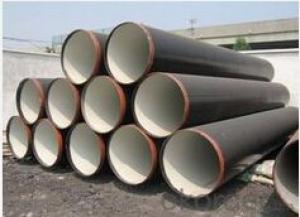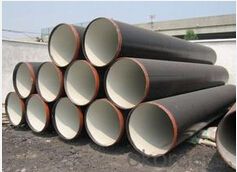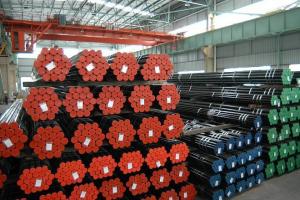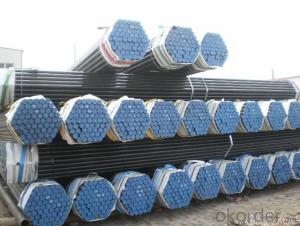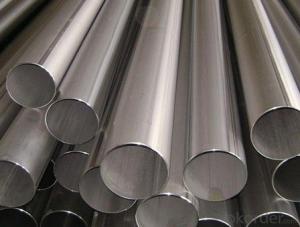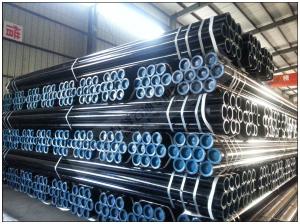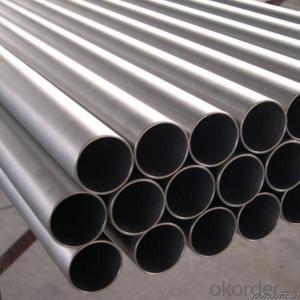API 5L seamless steel pipe line pipe for liquid transportation
- Loading Port:
- Tianjin
- Payment Terms:
- TT OR LC
- Min Order Qty:
- 25 m.t.
- Supply Capability:
- 60000 m.t./month
OKorder Service Pledge
OKorder Financial Service
You Might Also Like
Packaging & Delivery
| Packaging Detail: | in bundles by steel strips , and if required ,wrapped with PE cloth |
| Delivery Detail: | according to the quantity |
Specifications
API 5L seamless steel pipe/ASTM A106/A53
1)A,B, X42, X46, X52, X56, X60, X65, X70
2)OD:13.7-6-762MM
3)WT: 1-80MM
API 5L seamless steel pipe/ASTM A106/A53
1)A,B, X42, X46, X52, X56, X60, X65, X70, St37,ST52,
2)OD:13.7-6-762MM
3)WT: 1-80MM
SCH20,40,80
1. ends can be Threaded and Coupling
2. Aplication :tramsmission of petroleum, nature gas,water,air ect
3. Pipe Coating:
FBE (Fusion bong epoxy) coating
3PE (Three layer polyethylene) coating
3PP (Three layer polypropylene) coating
4. Cement mortar lining
Internal lining for drinkable water
Internal flow coating
5.Standard acc to: SY/T0135, SY/T0413, DIN30670/1/8, AWWAC205/210, etc
Steel grade | Machenic property | Chemical composition | ||||||||||||
σs | σb | δ5 | C | Si | Mn | P | S | Nb | V | Ti | Cr | Ni | Cu | |
min | min | min | max | max | max | max | max | min | min | min | max | max | max | |
A | 207 | 311 | 0.21 | - | 0.90 | 0.04 | 0.05 | - | - | - | - | - | - | |
B | 241 | 413 | 0.26 | - | 1.15 | 0.04 | 0.05 | - | - | - | - | - | - | |
X42 | 289 | 413 | 0.28 | - | 1.25 | 0.04 | 0.05 | - | - | - | - | - | - | |
X46 | 317 | 434 | 0.30 | - | 1.35 | 0.04 | 0.05 | - | - | - | - | - | - | |
X52 | 358 | 455 | 0.30 | - | 1.35 | 0.04 | 0.05 | - | - | - | - | - | - | |
X56 | 386 | 489 | 0.26 | - | 1.35 | 0.04 | 0.05 | 0.005 | 0.02 | 0.03 | - | - | - | |
X60 | 413 | 517 | 0.26 | - | 1.35 | 0.04 | 0.05 | 0.005 | 0.02 | 0.03 | - | - | - | |
X65 | 448 | 530 | 0.26 | - | 1.40 | 0.04 | 0.05 | 0.005 | 0.02 | - | - | - | - | |
X70 | 482 | 565 | 0.23 | - | 1.60 | 0.04 | 0.05 | - | - | - | - | - | - | |
- Q: What is the elasticity of steel pipes?
- Steel pipes exhibit elasticity, which allows them to undergo deformation when external forces are applied and regain their original shape once the force is no longer present. The high elasticity of steel pipes is well-known, as it enables them to endure different types of stress and strain without suffering permanent deformation. This characteristic is vital in situations where pipes experience pressure, bending, or other mechanical forces. The elasticity of steel pipes is determined by material properties like its Young's modulus, which quantifies its stiffness and capacity to resist deformation.
- Q: Can steel pipes be used for conveying compressed air?
- Yes, steel pipes can be used for conveying compressed air. Steel pipes are commonly used in applications where high pressure and durability are required, such as in industrial settings. Steel pipes have a high tensile strength and can withstand the high pressures generated by compressed air systems. Additionally, steel pipes are resistant to corrosion, which is important when dealing with moisture in compressed air. However, it is important to ensure that the steel pipes are properly sized and rated for the specific pressure and flow requirements of the compressed air system. Additionally, proper installation and maintenance practices should be followed to prevent any potential leaks or failures.
- Q: SC15 what does galvanized steel pipe look like?
- Ordinary galvanized steel pipe, the outer diameter is 1.5 inches
- Q: A333gr6 steel pipe and domestic material of the same?
- A333Gr.6 steel is no nickel steel is a kind of fine grain aluminum low temperature toughness of steel, therefore, also called Al killed steel. A333Gr.6 belongs to the United States ANSI and ASTM-SA333 cryogenic steel standards and is used at the lowest impact temperature of -46 degrees celsius. Its temperature, range of use and fracture toughness value are similar to those of domestic 16Mn steel (the minimum usage temperature of 16Mn steel is -40 degrees Celsius).
- Q: What are the different methods of protecting steel pipes from external damage?
- There are several methods of protecting steel pipes from external damage, including coating the pipes with a corrosion-resistant material such as epoxy or polyethylene, applying a layer of protective tape, installing a cathodic protection system, using concrete or rock shielding, and implementing measures to prevent soil movement or impact damage.
- Q: How are steel pipes sized and classified?
- Steel pipes are sized and classified primarily based on their outer diameter (OD) and wall thickness. The sizing of steel pipes is standardized to ensure compatibility and ease of use in various applications. The most common method of sizing steel pipes is by nominal pipe size (NPS), which is a North American standard that refers to a pipe's OD. NPS sizes range from 1/8 inch to 36 inches, with each size corresponding to a specific OD. For example, a 1/2-inch NPS pipe has an OD of 0.84 inches, while a 12-inch NPS pipe has an OD of 12.75 inches. It is important to note that the OD of a pipe may not necessarily match its actual measurement, as it is based on historical pipe dimensions. Additionally, steel pipes are classified into different schedules, which indicate the wall thickness of the pipe. The most common schedules are SCH 5, SCH 10, SCH 40, SCH 80, and SCH 160, with higher numbers representing thicker walls. These schedules are standardized and help in selecting the appropriate pipe for a given application. Furthermore, steel pipes may be further classified based on their end connections. The most common types include threaded, plain-end, and socket-weld connections. Threaded pipes have screw threads on both ends, allowing for easy assembly and disassembly. Plain-end pipes have no threads and are usually joined using welding techniques. Socket-weld pipes have a socket-like end that allows for welding with a corresponding fitting. In summary, steel pipes are sized and classified based on their outer diameter, wall thickness, and end connections. The nominal pipe size (NPS) indicates the outer diameter, while the schedule number represents the wall thickness. Understanding the sizing and classification of steel pipes is crucial in selecting the appropriate pipe for specific applications in industries such as construction, oil and gas, plumbing, and manufacturing.
- Q: What are the different types of coatings used for external protection of steel pipes?
- There are several types of coatings commonly used for the external protection of steel pipes, including fusion bonded epoxy (FBE) coatings, three-layer polyethylene (3LPE) coatings, three-layer polypropylene (3LPP) coatings, and coal tar enamel (CTE) coatings. Each of these coatings provide different levels of corrosion resistance and durability, depending on the specific requirements of the project or application.
- Q: Can steel pipes be used for wastewater treatment plants?
- Yes, steel pipes can be used for wastewater treatment plants. Steel pipes are commonly used in wastewater treatment plants due to their durability, strength, and resistance to corrosion. They are suitable for conveying and transporting various types of wastewater and can withstand the harsh and corrosive environment found in these facilities. Additionally, steel pipes can be easily welded and joined, allowing for efficient installation and maintenance processes.
- Q: How are steel pipes cleaned and flushed?
- Steel pipes are cleaned and flushed using a variety of methods. One common method is high-pressure water jetting, where water is forcefully sprayed through the pipes to remove debris and sediments. Chemical cleaning agents are also used to dissolve any stubborn deposits. Additionally, mechanical methods such as using wire brushes or pigs (devices inserted into the pipes to scrape the interior) can be employed to remove any remaining buildup. Regular maintenance and inspection are crucial to ensure the cleanliness and efficiency of steel pipes.
- Q: How are steel pipes used in the construction of coal-fired power plants?
- Steel pipes are commonly used in the construction of coal-fired power plants for various purposes. They are utilized for transporting coal and other fuels, as well as for carrying water and steam in the power generation process. Steel pipes are also used in the construction of the plant's cooling system, helping to circulate water and dissipate heat. Additionally, they are employed in the construction of the plant's exhaust system, facilitating the removal of combustion byproducts. In summary, steel pipes play a crucial role in the infrastructure of coal-fired power plants, enabling efficient fuel transportation, heat exchange, and waste management.
Send your message to us
API 5L seamless steel pipe line pipe for liquid transportation
- Loading Port:
- Tianjin
- Payment Terms:
- TT OR LC
- Min Order Qty:
- 25 m.t.
- Supply Capability:
- 60000 m.t./month
OKorder Service Pledge
OKorder Financial Service
Similar products
Hot products
Hot Searches
Related keywords
